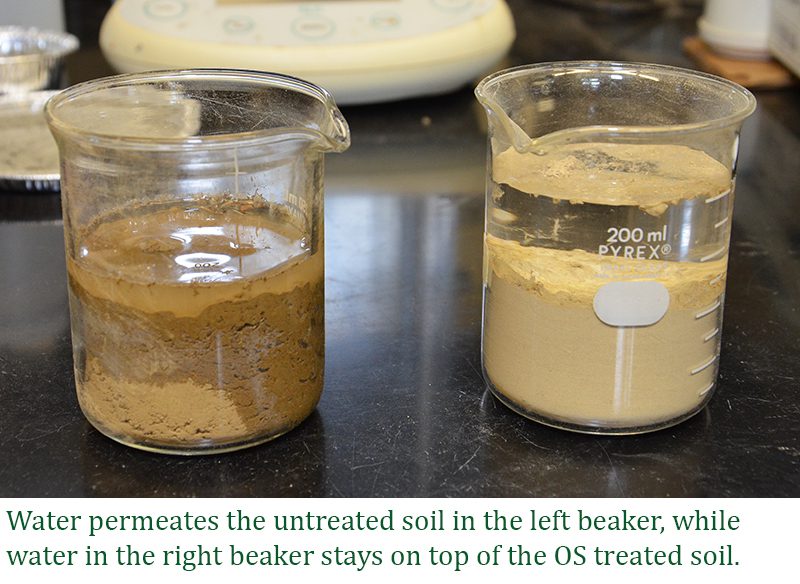Diverse Geoenvironmental Team Bringing Expertise to Mitigating Frost Heaving
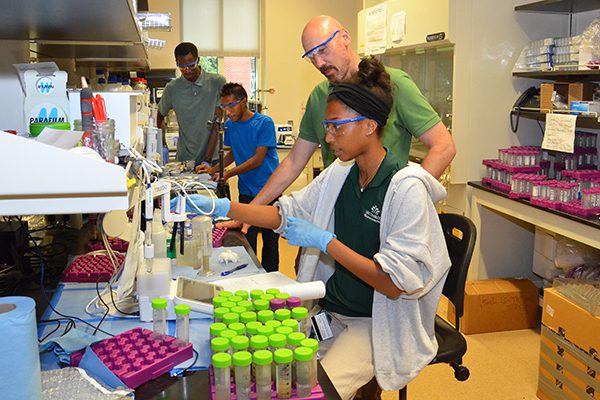
A freezing-weather problem that results in billions of dollars in road maintenance costs across the entire United State is now being studied in a laboratory in North Carolina. A team of researchers from the Civil and Environmental Engineering Department at UNC Charlotte is bringing its expertise in the use of organo-silanes (water-repellent additives) to create hydrophobic soil to solve the problem of frost heaving. The team members have a variety of experience and skills directly related to the issue, even though a number of the them have never seen frost or snow.
The project, “Engineered Water Repellency to Mitigate Frost Susceptibility”, involves working with soils from Fairbanks, Alaska; Hanover, New Hampshire; Lansing Michigan; four different counties across Iowa; and Boone and Asheville, North Carolina. The researchers involved have roots in New Hampshire, Iowa, Michigan, Maryland and North Carolina, and also Nigeria and Mauritius, a small island east of Madagascar. A researcher from Seoul, South Korea will be joining the team in 2022.
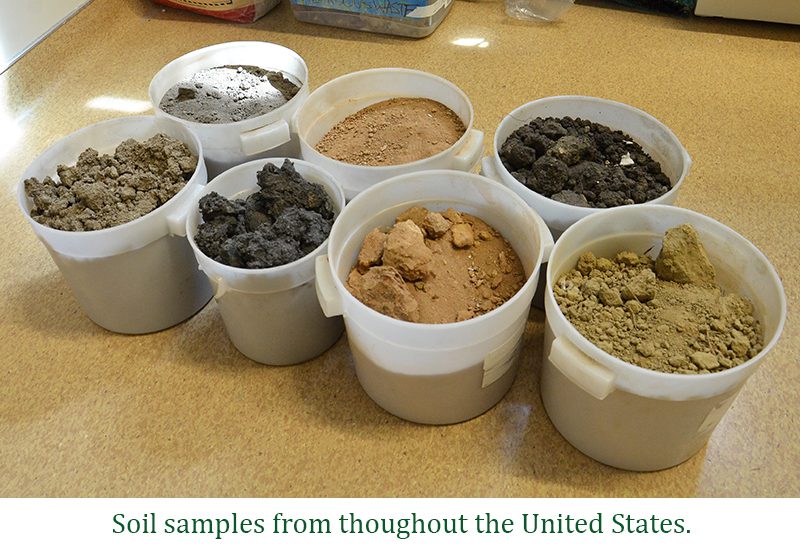
“I’m a soils guy, and this project is great because I get to work with soils from all over the country,” said Dr. John Daniels, the project’s principal investigator and also the chair of Civil and Environmental Engineering at UNC Charlotte. “The project brings to bear our expertise in a number of soil-related areas, delivered by a diverse group of researchers from throughout the country and the world.”
Before coming to UNC Charlotte, Dr. Daniel’s performed cold-region-focused soils research as a graduate student at the University of Massachusetts at Lowell. In Charlotte, he and his colleagues have spent years researching water repellency for soils and coal fly ash. They have also completed a project for the North Carolina Department of Transportation (NCDOT) involving the use of modified lime and cement to improve the soils in road beds, which allows for longer lasting highways that can be constructed during cold months.
Dr. Daniels observes that, “Frost heaving has significant impact on civil infrastructure, such as roads, bridges and building foundations. Frost causes excessive settlement, foundation instability and even structural failure. This research is investigating the extent to which organo-silanes (OS) mitigate frost heaving, while identifying the controlling physical and chemical mechanisms. This research has the potential to dramatically extend the service life of civil infrastructure and to introduce a new approach to soil and foundation improvement.”
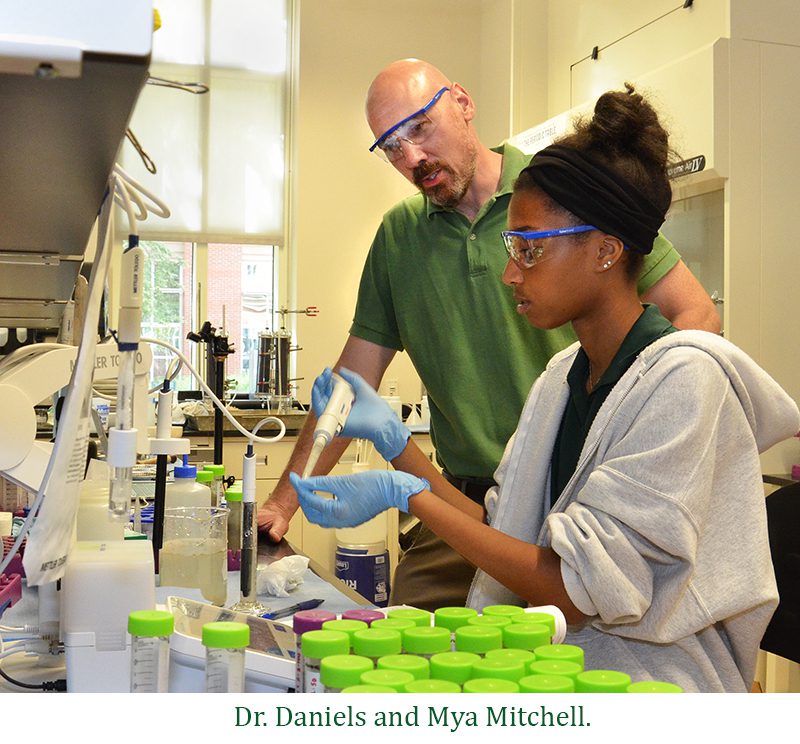
The National Science Foundation is funding the basic science involved in the research. The Iowa Highway Research Board is matching the NSF funding, and is interested in the practical application of the research on unpaved roads. Also involved is the US Army Cold Regions Research and Engineering Lab (CRREL), which is providing the soil samples from New Hampshire and Alaska. Researchers at Michigan State University are also collaborating in the project.
“Frost heaving of soil requires freezing temperatures, water availability and frost-susceptible soils,” Dr. Daniels said. “If any one of these factors is controlled, frost heave is prevented. Our research focuses on controlling water availability.”
Investigators will look at whether OS can effectively and consistently mitigate frost heaving and strength loss of subgrade soils due to freeze-thaw cycles, and whether OS can predictably transform frost susceptible into frost resistant soils. These goals will be achieved by conducting laboratory and field tests, as well as computer-based modeling, to evaluate performance.
The diverse team of researchers has come together because of the multifaceted nature of the work, Dr. Daniels said. “Several of them have no personal experience living in freezing climates, but the cross-disciplinary nature of the work is inherently interesting to geoenvironmental engineers. And it is related to more ubiquitous processes, such as wetting/drying and shrinkage/swelling,” he said.
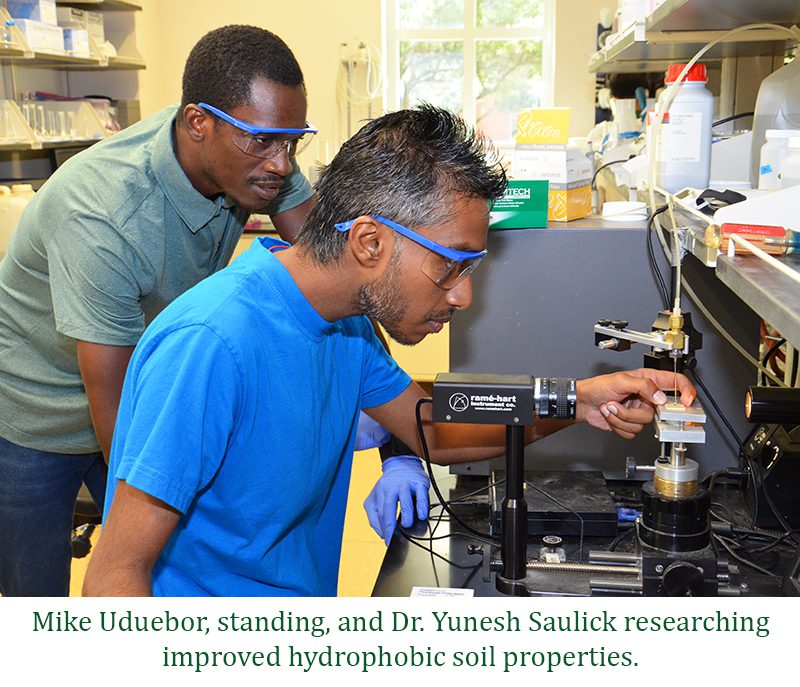
Project researcher Mike Uduebor is a Ph.D. student from Nigeria. “I tell people I come from a country where there is no snow,” he said. “Now I am involved with snow and cold and their impacts on frost heaving, which to me is very interesting. What we’re basically doing is engineering water repellency into the soils and hopefully mitigating the impact of freezing on frost heaving. Right now, we are trying different compounds to determine chemical effectiveness.”
The current work is being done in the laboratory. The next step will be field testing to develop methods to deliver the compounds, whether that is through spraying, injection or mixing.
“Everything we are doing is novel and new,” Uduebor said. “This can be a game changer. Statistics show frost heaving costs the US about $20 billion a year in road maintenance costs, and this would help to save that amount and money so it can be used for other transportation projects.”
Dr. Yunesh Saulick is a postdoctoral researcher from Mauritius. He completed his bachelor’s degree there, and then did his master’s and Ph.D. in Hong Kong. “Now I’m here, having arrived just a month ago,” he said. “I’m from a tropical region, so this is quite new and interesting. It is related to the research I have done for years, and here I am able to apply what I already know to a new application. Also, I am happiest when I’m in a laboratory, so this is perfect for me.”
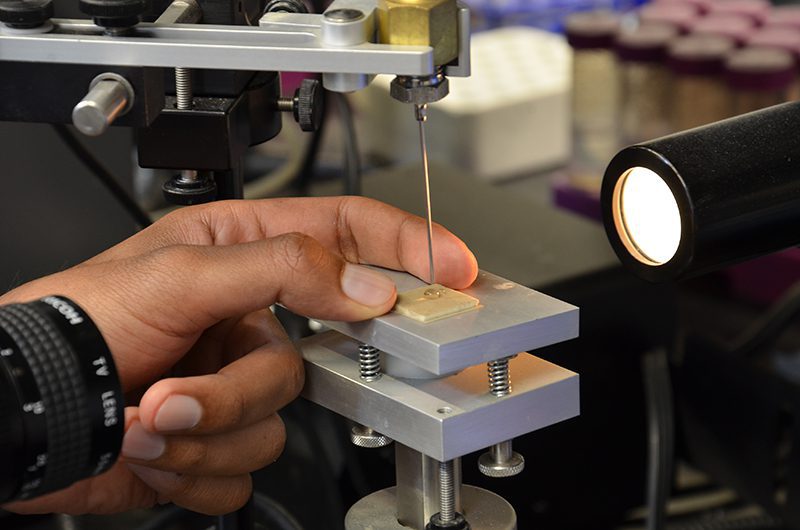
The laboratory work is also being supplemented by both physics-driven and data-driven computer modeling. Physics-driven models compute the variable physical and chemical possibilities to predict results. Data-driven models are based on historical data, and use pattern recognition and trends to make predictions.
“Current project modeling is motivated by hypothesis testing and an evaluation of ‘known unknowns,’” Dr. Daniels said. “The data-driven approach will enable the team to explore higher-risk, higher-reward possibilities that may be described as “unknown unknowns’. These data-driven models can serve as the linkage between basic science and translational application.”
After being slowed for a time by the pandemic, the initial laboratory work is now going well and showing good results. The work is also providing a great educational experience for the researchers involved.
“We have one postdoc getting an excellent research experience and a visiting professor on the way from South Korea,” Dr. Daniels said. “We have a Ph.D. student pursuing his dissertation, and undergraduate student Mya Mitchell is gaining research experience as a Levine Scholar.”
A junior in Civil and Environmental Engineering, Mitchell is running lab tests on silt to determine pH. levels, electrical conductivity, sizing, specific gravity, composition, contact angle and other properties.
“I’m here for the summer,” Mitchell said, “and it’s fun. I’m getting to see the different fields of civil engineering. I want to do environmental engineering and this is geo-environmental. I’m planning to go on to do a master’s degree and this is helping me figure out the area I want to go into.”
For more information on the UNC Charlotte frost heaving project see:
NSF grant award
ASCE Article
